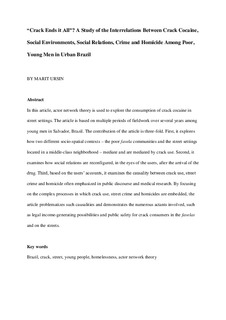“Crack ends it all?” A study of the interrelations between crack cocaine, social environments, social relations, crime, and homicide among poor, young men in urban Brazil
Journal article, Peer reviewed
Accepted version
Permanent lenke
http://hdl.handle.net/11250/2455141Utgivelsesdato
2014Metadata
Vis full innførselSamlinger
Sammendrag
In this article, actor network theory is used to explore the consumption of crack cocaine in street settings. The article is based on multiple periods of fieldwork over several years among young men in Salvador, Brazil. The contribution of the article is three-fold. First, it explores how two different socio-spatial contexts – the poor favela communities and the street settings located in a middle-class neighborhood – mediate and are mediated by crack use. Second, it examines how social relations are reconfigured, in the eyes of the users, after the arrival of the drug. Third, based on the users’ accounts, it examines the causality between crack use, street crime, and homicide often emphasized in public discourse and medical research. By focusing on the complex processes in which crack use, street crime and homicides are embedded, the article problematizes such causalities and demonstrates thenumerous actants involved, such as legal income-generating possibilities and public safety for crack consumers in the favelas and on the streets.
